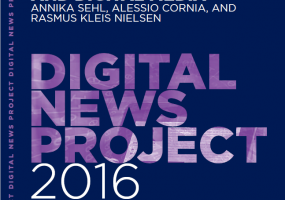Report on UK Press Coverage of EU Referendum Campaign wins two awards at the AMEC Summit
24 May 2017
A report from the Reuters Institute and PRIME Research UK has won gold and silver awards at the AMEC Awards in Bangkok. Run by the International Association for Measurement and Evaluation of Communication (AMEC), the awards recognise excellence in bringing research measurements and analytics to the fore. The Reuters Institute and Prime Research UK won gold in the category ‘Best Measurement of a Public Sector Campaign’ and silver in the category ‘Best Use of Measurement for a Single Event’ for the report UK Press Coverage of the EU Referendum.
Diego Bironzo, from PRIME Research, says of the win: “PRIME Research was delighted to partner once again with the Reuters Institute for the Study of Journalism on such a fascinating project. The historic relevance of the EU referendum, and the desire to understand the role played by the media, were great motivating factors for us all. The AMEC awards which we received last week in Bangkok are testament to PRIME's in-depth approach to content analysis and to our fruitful partnership with the RISJ.”
The report analysed data provided by PRIME Research, collected from nine newspapers on two days of press coverage (Tuesdays and Saturdays) each week over the four months of the campaign, from February 20-June 21, 2016. The sample included the London editions of the five largest tabloids and mid-market papers, namely the Sun, Daily Mail, Daily Star, Daily Express and Daily Mirror, as well as the four broadsheets; the Times, Guardian, Financial Times and Daily Telegraph.
Lead author David Levy, Director of the Reuters Institute, said the research “revealed a picture of highly polarised press coverage, reliant on a narrow range of voices. […] In spite of some notable exceptions, the press was generally better at reinforcing the views of decided voters than in giving undecided voters, seeking broad facts and high-quality information, the evidence to make up their own minds.”
Notable findings include a dominant pro-Leave bias; 41% of articles surveyed supported the UK exiting the EU, and a focus on the economy from both Leave and Remain campaigns. Almost half of the spokespeople cited in articles were either UK politicians or campaign representatives, with experts making up just 11% of spokespeople cited. Read the full report here.


